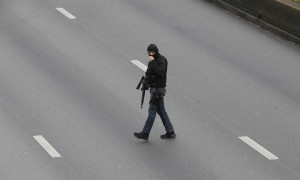Science Seen Physicist and Time One author Colin Gillespie helps you understand your world.
The Terrorism Ecosystem
It’s easy to feel helpless in the face of reports of terrorism. Yet we all can do something to stop it. This is  especially true of those who work (as I do) at journalism: writing news and editing and publishing. Do journalists have a special duty when terrorism becomes news? It’s widely thought that journalists have a duty to get news out to the public. But is new terrorism simply news? I think not. Let me explain: I think journalists have a particular relationship with terrorism.
especially true of those who work (as I do) at journalism: writing news and editing and publishing. Do journalists have a special duty when terrorism becomes news? It’s widely thought that journalists have a duty to get news out to the public. But is new terrorism simply news? I think not. Let me explain: I think journalists have a particular relationship with terrorism.
Science has something to say to us about this. In 1859 Charles Darwin showed how species evolve to fill every available niche. (Here, niche means the conditions that allow a life form to survive.) Since then science has found that life forms don’t wait passively for niches to become available. They actively build niches. These are facts of life. They apply to all kinds of life; including (I submit) to terroristic life.
Modern terrorism is a business. Smart people manage it. They publicly proclaim that their business plan is to bleed our economy until it collapses. So far they’re not doing badly. In 2001 bin Laden says he will arrange for us to bleed it for him. And he does; soon Bush invades Iraq and a critic calls him ‘a terrorism recruiter’s wet dream’. Today, some stories about terrorism in the mainstream media amount to free promotion. They help terrorists recruit naïve idealists. Make no mistake about how key this is: A business whose modus operandi involves killing off its own recruits needs new supply or it will not survive. Some mainstream media seem careless of their contributions to this, making music and a logo for each new atrocity even before their team gets to the scene. It seems like symbiosis. A cynic might suggest there is a tacit deal: Terrorism shapes the story; journalism sells it. Between them they maintain the niche that terroristic organisms need.
It’s somehow surprising that this is not treated as a crime. But, since it’s not, we journalists are left to ponder our responsibilities. Here is my two-bits’ worth: Let’s be more thoughtful with our language. For example, how often have you heard somebody claimed responsibility for a terror crime? Where does this language come from? You don’t claim responsibility for murder. If you did the deed you may admit it. But journalism has connected the word claim with terrorism so effectively a leading dictionary gives this as its example: No one has yet claimed responsibility for yesterday’s bombing. Terrorists want to claim. We need not oblige them. If they admit the crime let’s use our word, not theirs. Likewise, why do journalists say execute when they mean murder? Execution implies lawful trial, conviction and sentence. And how can journalists describe terrorists as Muslims or Islamists without actually knowing anything of their beliefs?
The bad news is that these and other journalistic blunders tart up terrorism’s image for recruits. But the good news is we can undo the damage. Science has something to tell us about this too: A tiny change in any organism’s niche can doom it to extinction. For example, a small decrease in the alkalinity of seawater could destroy the Great Barrier Reef, an organism that’s so big it’s visible from space.
So journalism’s in a unique position. It can support the terrorism ecosystem. Or it can, with modest effort and maybe financial loss, turn it off. If you don’t like terror, you can do your bit to make a better world for the next generation. Ask a journalist to take more care with language about terrorism; ask your friends to do the same.
Sources:
Bruce Brown (2004), “Why Osama bin Laden is voting for George W. Bush”, The Skinny, March, http://www.astonisher.com/skinny/skinny_osama.html#2004
Longman Dictionary of Contemporary English, http://www.ldoceonline.com/dictionary/claim_1
Other Materials:
Odling-Smee, John F. (2003). Niche Construction: The Neglected Process in Evolution. Princeton, New Jersey: Princeton University Press; http://lalandlab.st-andrews.ac.uk/niche/Evolution.html
Arda Bilgen (2012), “Terrorism and the Media: A Dangerous Symbiosis”, E-International Relations, July 22, http://www.e-ir.info/2012/07/22/terrorism-and-the-media-a-dangerous-symbiosis/
Image source:
AP Photos, Newstalk (2105), WNTP, January 10, http://www.newstalk990.com/news/articles/ap-photos-french-security-forces-end-3-days-of-terror

No comments yet.